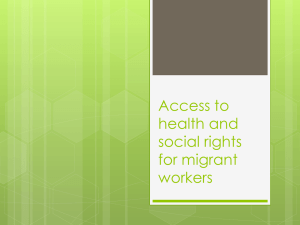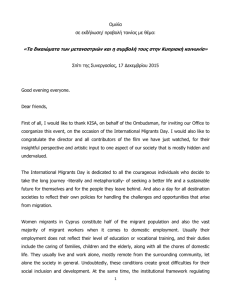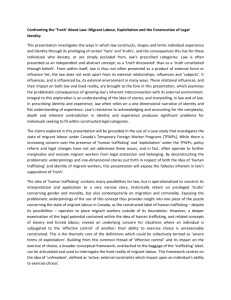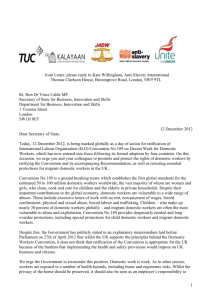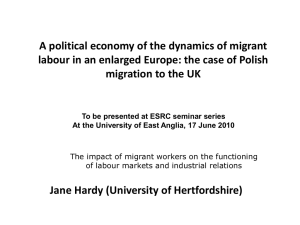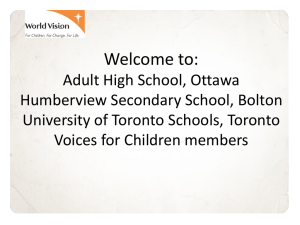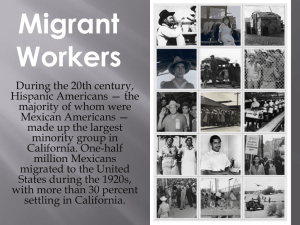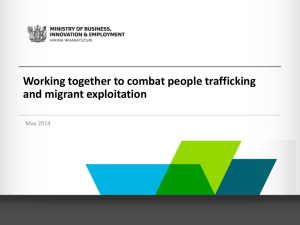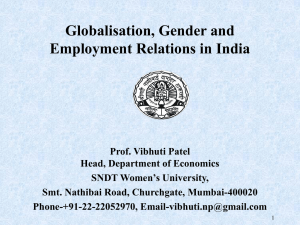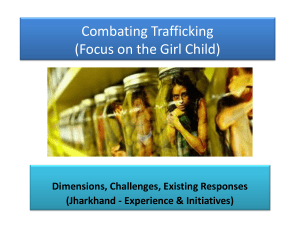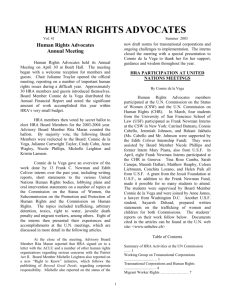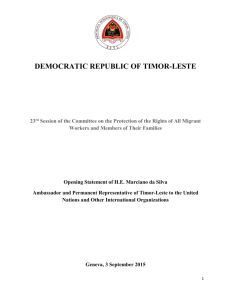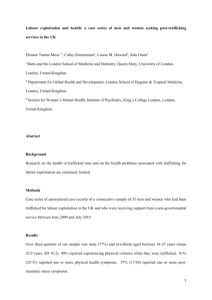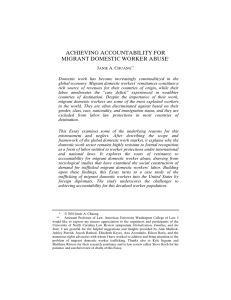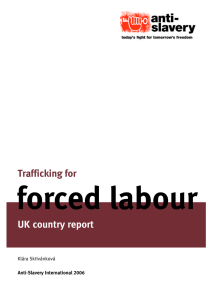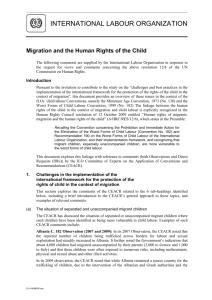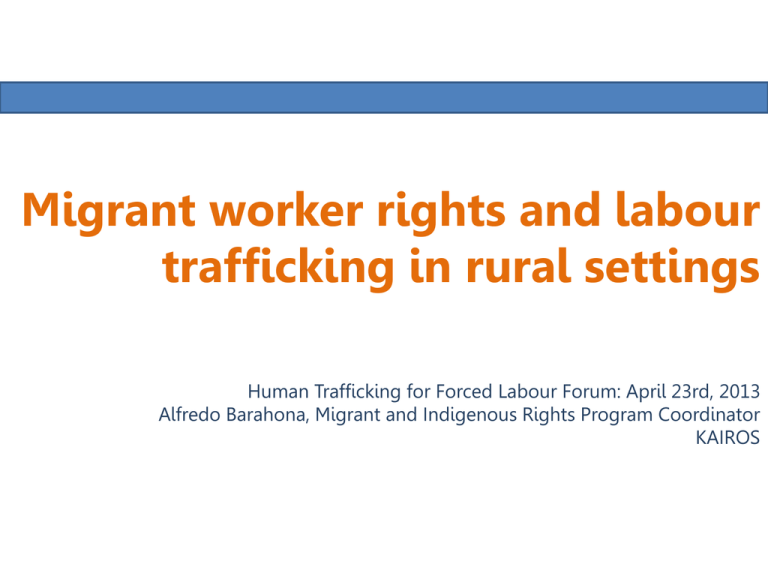
Migrant worker rights and labour
trafficking in rural settings
Human Trafficking for Forced Labour Forum: April 23rd, 2013
Alfredo Barahona, Migrant and Indigenous Rights Program Coordinator
KAIROS
Overview
• Working and Living Conditions of TFWs in Canada
• Definition of Human Trafficking
• Elements of Human Trafficking in the TFWP
• Labour and Human Rights Instruments
• Recommendations
Working and Living Conditions of TFWs in Canada
Many migrant workers pay between $10,000.00 $15,000.00 (CAD) to Recruiters
Huge debts to pay
Some workers don’t have contracts
Some can’t read their contracts
Unexpected expenses in Canada (income tax, transportation, housing, food)
Working 12 hours a day, 6-7 day per week
Unsafe and unhealthy living conditions
Not taken to the “place of employment” listed on the
contract
Work permit tied to specific employer
Out of work when farms do not have sufficient work
Some have worked for $7.50/hr because agents took
$1.50/hr from their pay
Others have worked, at times, for as little as $7 - $10/day
Sue Wilson, CSJ, Office for Systemic Justice Canadian Federation of Sisters of St. Joseph. Migrant Workers in Canada: Working in Situations with Significant
Elements of Human Trafficking
Trafficking in persons
“Trafficking in persons” shall mean the recruitment,
transportation, transfer, harbouring or receipt of
persons by means of the threat or use of force or other
forms of coercion, abduction, fraud, deception, the
abuse of power or of a position of vulnerability or
giving or receiving of payments or benefits to achieve
the consent of a person having control over another
person, for the purpose of exploitation.
Exploitation shall include, at a minimum, the
exploitation of the prostitution of others or other forms
of sexual exploitation, forced labour or services, slavery
or practices similar to slavery, servitude or the removal
of organs;
Protocol to Prevent, Suppress, and Punish Trafficking in Persons, Especially Women and Children Supplementing The United
Nations Convention Against Transnational Organized Crime
Elements of human trafficking in the TFWP
Fraud and Misrepresentation
Control and Coercion
Exploitation
Labour and Human Rights Instruments
• Universal Declaration of Human Rights
• International Conventions on the protection on the
rights of migrant workers and members of their
families
• Canadian Charter of Rights and Freedoms
• Canadian Labour Law
Universal Declaration of Human Rights
Article 23
1. Everyone has the right to work, to free choice of
employment, to just and favourable conditions of
work and to protection against unemployment.
2. Everyone, without any discrimination, has the right to
equal pay for equal work.
3. Everyone who works has the right to just and
favourable remuneration ensuring for himself and his
family an existence worthy of human dignity, and
supplemented, if necessary, by other means of social
protection.
4. Everyone has the right to form and to join trade
unions for the protection of his interests.
International Convention on the
Protection of the Rights of All Migrant
Workers and Their Families
Article 11
1. No migrant worker or member of his or her family
shall be held in slavery or servitude
2. No migrant worker or member of his or her family
shall be required to perform forced or compulsory
labour
Canadian Charter of Rights and Freedoms
12. Everyone has the right not to be subjected to any
cruel and unusual treatment or punishment
15.(1) Every individual is equal before and under the
law and has the right to the equal protection and
equal benefit of the law without discrimination and,
in particular, without discrimination based on race,
national or ethnic origin, colour, religion, sex, age or
mental or physical disability.
15 (2) Subsection (1) does not preclude any law,
program or activity that has as its object the
amelioration of conditions of disadvantaged individuals
or groups including those that are disadvantaged
because of race, national or ethnic origin, colour,
religion, sex, age or mental or physical disability.
Labour law and migrant workers in Canada
Canadian laws protect every worker in Canada. This
includes temporary foreign workers like you.
Your employer:
must pay you for your work
must make sure that your workplace is safe
cannot take your passport or work permit away from
you
A person at your local employment or labour standards
office can talk to you about fair pay, hours of work, rest
periods, working conditions and provide other services.
You do not need your employer’s permission to call this
office or visit its website. An employer cannot punish
you or have you deported for contacting an employment
standards office.
Refusing Dangerous Work
Most of the time, you have the right to refuse to work
if you believe that the work you are doing or have been
told to do is dangerous.
You must be paid until the danger is removed
you feel the problem no longer exists or
a government official tells you that it is safe to do the
work.
Your employer cannot punish you for refusing
dangerous work.
Wages, Working Conditions and Occupations
Employers must provide TFW with the same wages and
benefits as those provided to their Canadian citizen
and permanent resident employees working in the
same occupation.
In addition, TFWs working in a unionized environment
must be paid the wage rate as established under the
collective bargaining agreement.
http://www.cic.gc.ca/english/work/tfw-rights.asp
Recommendations
Work together with people from different sectors in
society but in particular with people who have been
trafficked to:
Help implement public education to raise awareness
on issues of and the intersections between human
trafficking , forced labour and migrant workers
Support and participate in civil society advocacy
campaigns to protect the human rights of migrant
workers
Take actions to hold elected officials and bureaucrats
accountable in their responsibility to monitor and
enforce the human rights of migrant workers
Thanks!

